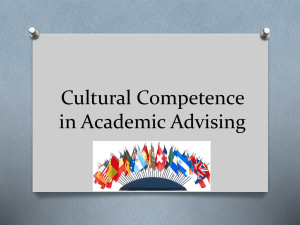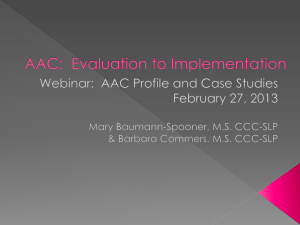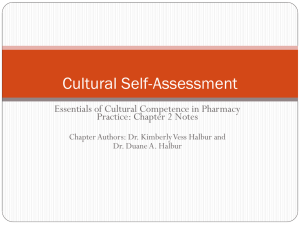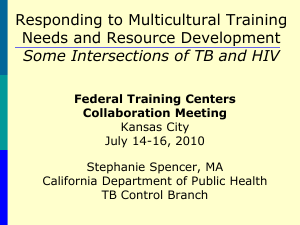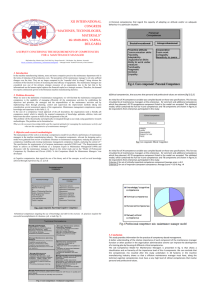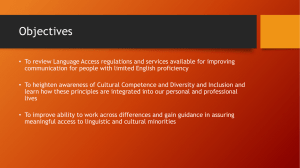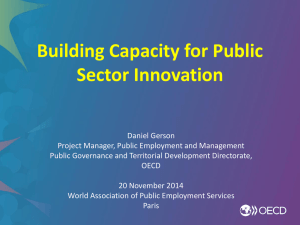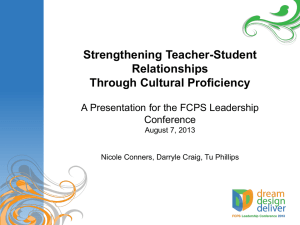presentation_day10_5feb2015
advertisement
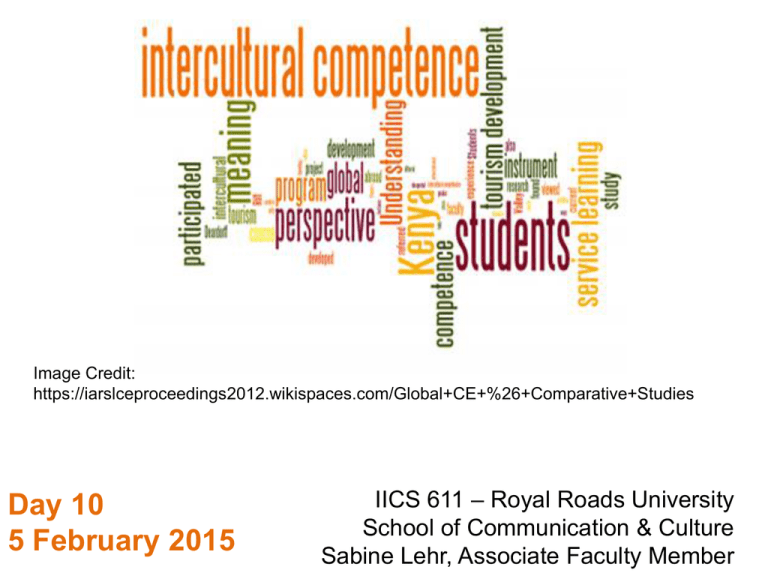
Image Credit: https://iarslceproceedings2012.wikispaces.com/Global+CE+%26+Comparative+Studies Day 10 5 February 2015 IICS 611 – Royal Roads University School of Communication & Culture Sabine Lehr, Associate Faculty Member 2 Day 10 – Assessment, Evaluation, Research Assessment, Evaluation and Research in Intercultural Competence READINGS Textbook: Chapters 26 and 27 3 Day 10 – Assessment, Evaluation, Research Chapter 26: Research Application What’s the problem? • Multitude of deficiencies in established models of diagnostic instruments to determine cross-cultural profiles and competence • Existing frameworks are not free of cultural bias (e.g., Western organizations imposing Anglo-Saxon human resource competence systems on entirely different organizational cultures) • Shift from task oriented work to person oriented work environment (employability based on contemporaneous skills) • In demand: people with competencies transferable to multiple locations 4 Day 10 – Assessment, Evaluation, Research “Extreme” definitions of competence/y/s/ies: Competency/ competencies Skills and knowledge employees must have or acquire to input into a situation to achieve high levels of performance (what you know/skills and knowledge) Popular in the United States Competence/ Competences System of minimum standards and effective behaviours demonstrated by performance and outputs (what you do/how you apply knowledge in practice) Popular in Europe See Table 26.1 in Textbook 5 Day 10 – Assessment, Evaluation, Research How to design a framework and associated (research) instrument that covers the spectrum of cultural effects that is itself free of cultural bias? Is culturally neutral research possible? 6 Day 10 – Assessment, Evaluation, Research Varying paradigms of assessments Domain Nature or Nurture Cognitive – measuring capacity Rarely changes as one grows older Motivational – measuring purpose Shifts over time and can align with organization’s goals Personality – measuring Set in formative years, but can change a little tendencies/approaches throughout life (dramatic events) to life Values – determining value & belief systems Measurement of meaning, mainly set in formative years from collective cultural programming Behavioural – measuring actions Can be learned and modified at any time Organizational culture Context that affects the way things are done around organization 7 Day 11 – Assessment, Evaluation, Research Sublevels of “hypercultural competence” Hypercultural competence Outcomes Cross-cultural competence: Capability to function according to cultural rules of more than one system; respond in culturally sensitive way Avoid blunders/embarrassment; no ethnocentricity Intercultural competence: Successful communication and effective collaboration with people of other cultures; respect of others Communicate/work with other cultures Transcultural competence: Capability to connect different points of view through elicitation of dilemmas and their reconciliation Reconcile differences Transcultural competence: Capability to deliver business benefits of cultural reconciliation through servant leadership Leverage business benefits Intracultural competence: Capability to leverage cultural and/or ethnic diversity and differences within teams Managing and leveraging business benefits of diverse teams and employees 8 Day 10 – Assessment, Evaluation, Research Recognition An individual’s capacity to understand his or her condition in the community and the world, and thereby make effective judgments = global consciousness Relates to cross-cultural competence as subcomponent of hypercultural competence Elements: •Awareness of nations, cultures, civilizations •Critical self-awareness 9 Day 10 – Assessment, Evaluation, Research Respect Basis for our attitudinal, cognitive, and behavioural orientations toward people who hold a diversity of values Relates to intercultural competence as subcomponent of hypercultural competence Elements: •Respect for human dignity and uniqueness of persons •Acceptance of other (cultures’) values 10 Day 10 – Assessment, Evaluation, Research Reconciliation An individual’s propensity to deal with the differences of which one is both aware and that one respects Relates to transcultural competence as subcomponent of hypercultural competence Elements/levels of reconciliation: •Aspects of human relationships •Aspects of time •Inner and outer worlds 11 Day 10 – Assessment, Evaluation, Research Realization An individual’s propensity to deal with the differences of which one is both aware and that one respects Relates to transcultural competence as subcomponent of hypercultural competence Elements of realization: •Achieving the task •Developing the team to complete the project •Managing individuals 12 Day 10 – Assessment, Evaluation, Research Trompenaars & Woolliams’s General Framework of Competence for Today’s Global Village (Figure 26.1 on p. 445) Watch the following short video “The Interview” and pay attention to the particular cluster you have been assigned http://www.youtube.com/watch?v=n6kUaDp5FV U&list=PLc8EucmoIj0RP5vF_7GDxvuebfX5G4wpX 13 Day 10 – Assessment, Evaluation, Research Intracultural (In)competence In the following video, pay attention to how employees’ team roles intersect with their interpersonal relationships and cultural identities NorQuest College http://media.norquest.ca/mds/owls/videos.htm “Building Effective Multicultural Workplaces” (11 min) 14 Day 10 – Assessment, Evaluation, Research Chapter 27: Assessing Intercultural Competence Dilemmas: Lack of consensus regarding terminology Lack of consensus on reliable assessment tools Lack of experience assessing attitudes and awareness vs. knowledge and skills Centrality of language proficiency 15 Day 10 – Assessment, Evaluation, Research Assessment (long term) Assessment Resources Implementation Needs assessment Educational precepts Goals and objectives Curriculum/syllabus The Gemstone Model (by Fantini, from Textbook p. 461, Figure 27.3) 16 Day 10 – Assessment, Evaluation, Research Test Types Readiness tests Placement tests Diagnostic tests Aptitude tests Attitude tests Formative tests Proficiency, communicative, or competency-based tests Criterion-referenced & norm-referenced tests Bilingual or culture-language dominance tests Achievement or standardized tests 17 Day 10 – Assessment, Evaluation, Research Intercultural Development Inventory – Introduction (3:30min) http://idiinventory.com/video/an-introduction-to-theintercultural-development-inventory-3-28-minutes/?id=357 Intercultural Development Inventory – Workplace Impact (4:30min) http://idiinventory.com/video/workplace-impact-of-theintercultural-development-inventory-4-27-minutes/?id=360 18 Day 10 – Assessment, Evaluation, Research Intercultural Development Inventory http://www.idiinventory.com/ The Intercultural Development Inventory® (IDI®) is a statistically reliable, cross-culturally valid measure of intercultural competence adapted from the Developmental Model of Intercultural Sensitivity. The IDI can be used for a wide variety of purposes, including: • Individual assessment in coaching, counseling situations • Group analysis in teambuilding efforts • Organizational-wide needs assessment for training design • Program evaluation to assess the effectiveness of various interventions • Research The IDI is a 50-item, theory-based instrument that can be taken either in paper and pencil form or online. 19 Day 10 Wrapup and Outlook Readings for Tuesday, February 10 Textbook: Chapter 29 The Real Cost of Intercultural Incompetence Article by Sudhoff (2010) Content- and language-integrated learning
